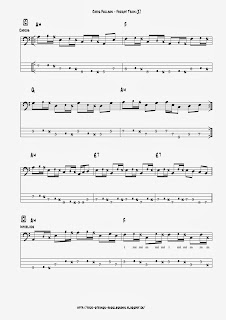Here's the second part of my little workshop on the subject of "line clichés". If you haven't read the first part yet, I strongly recommend to do so (
Line clichés part 1).
In part 1 I showed you line clichés against minor chords, which are by far the more common ones.
In this part I want to talk about line clichés against major chords.
TYPE C
This type is starting from the root
C of the c major chord and descending chromatically to the
A. It's the major equivalent to line cliché
type a:
In Joe Cockers “
You Are So Beautiful” the piano uses this “line cliché” to accompany the three first words of the vocal line:
TYPE D)
Finally here’s the “line cliché” with a major chord and an ascending line from the 5th.
A very famous example for the
type d line cliché is the samba tune “
Aquarela do Brasil” by Ary Barroso written in 1939.
Here's a version of this tune by Kate Bush recorded for the 1985 movie "Brazil" by Terry Gilliam:
A variation of this
type d "line cliché" is used in this weeks requested transcription.
The wonderful tune "
Midnight In Harlem" (
requested by Marina) by the
Tedeschi Trucks Band uses an ascending line cliché with a stepwise movement in whole tones instead of the chromatic semitones found in the example of "Aquarela do Brasil":
The nice atmosphere created by this stunningly beautiful chord-progressions is complemented by a amazing bassline of
Oteil Burbridge and an extraordinary slide-solo by Dereck Trucks. This is a real piece of art!
Thanks again to Marina for the donation and this really inspiring request!















.TIF)
.TIF)
.TIF)
.TIF)



























.jpg)

.jpg)











